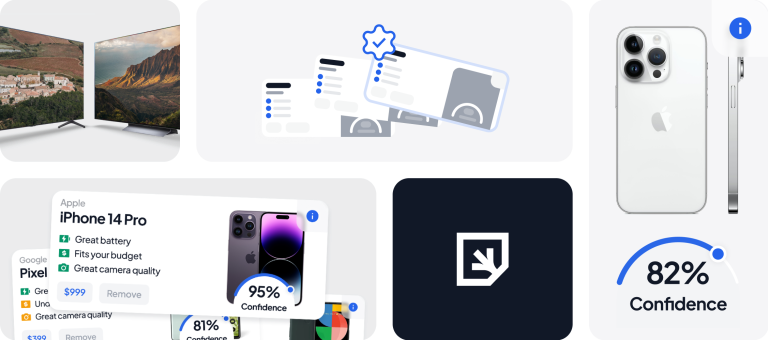How It Works

Our Mission
Finding exactly the right product should be easy. That’s why we made PerfectRec.
You can spend hours reading product reviews online. Some of them are great. Some of them are scammy. Some of them are totally impenetrable. A lot are not particularly helpful — Here Are the 25 Best Phones! — and none consider your specific needs. That’s because even the most popular review sites are only trying to find something that’s good enough for most people. But you’re not most people, and you don’t need to settle for good enough.
So we built something different. It’s not a list of generic recommendations for generic people. It’s a decision engine that combines the real-life knowledge of top subject matter experts with the power of machine learning to find the best products for you.
How We Do It
Researching the best products can feel like a full-time job, because it is a full time job. We scoured the internet (and the world) to find top product experts in unlikely places — not just pros, but true obsessives, the kind of people who run product-specific subreddits and consider TV hardware “a hobby.” One of our phone experts owns 33 different Androids, just for fun.
Then, we put them to work doing what they do best: obsessing over each product in granular detail. Our experts compile, review, and verify product stats by hand — we don’t rely on scraping. They also filter out the junk. We don’t include every single phone available in our calculations. If a model doesn’t meet our expert quality thresholds, we’re not going to recommend it to you. Finally, they figure out what really matters in a product: what are the specs you should actually care about? What separates a good laptop from a bad one? What’s genuinely exciting, and what’s manufacturer jargon? Is a TV truly bright enough for a sunny room, or is the manufacturer lying about its nits?
The experts then turn their analyses over to our Recommendations Team. They comb through the expert data, translate it into a series of simple, straight-forward questions anyone can answer, and then use the latest machine learning methods to find the best options on the market for your specific needs.
What you see: a series of easy-to-answer questions about what you’re looking for, and how you’ll be using it. As you answer, we update our recommendations in real time, eliminating the wrong products and honing in on the right ones. And we explain our thought process: we don’t just spit out our final three recommendations, we also give you the context to understand why we picked what we did.
Why Trust Us?
Because we’re a little bit nuts. Between us, we have PhDs from Stanford, UC-Berkeley, and the University of Michigan. We’re economists and machine learning researchers. Our technical advisor teaches Machine Learning at Berkeley. Our CEO has a PhD in Economics with a focus on ecommerce and pricing. We came together to work on this project because giving personalized recommendations at scale is hard — and we like a challenge.
Because we’re data-science driven. Complicated choices need complicated tools. Say you want a phone, but you don’t want to spend more than $700. And you want the best possible battery life. But also, you don’t want it to be too big. And it’s got to be an iPhone. Those are all totally reasonable preferences. But if you put all that into the kind of simple filtering system you might find on other websites, it could easily return…nothing at all. Sorry, you’re out of luck, the best possible battery life is incompatible with a smaller phone, it’s just physics. Our recommendation model lets us take all your needs into account, even when they conflict. We take your preferences seriously, but we also tell you when we think you should consider being just a little bit flexible — there's no reason to settle for an inferior product when the perfect model for you is just $5 over your ideal budget. Or maybe, given your other preferences, we really, really think you should consider a slightly bigger phone in order to get the best camera quality for your labradoodle’s Instagram. In other words, we’re able to capture the nuanced advice you’d get if you were talking with an expert one-on-one, in seconds and on demand.
Because we’re 100% independent. We have no corporate overlord and no external funding. We don’t have any incentive to push a particular product.
Product Details
What goes into finding the perfect TV.